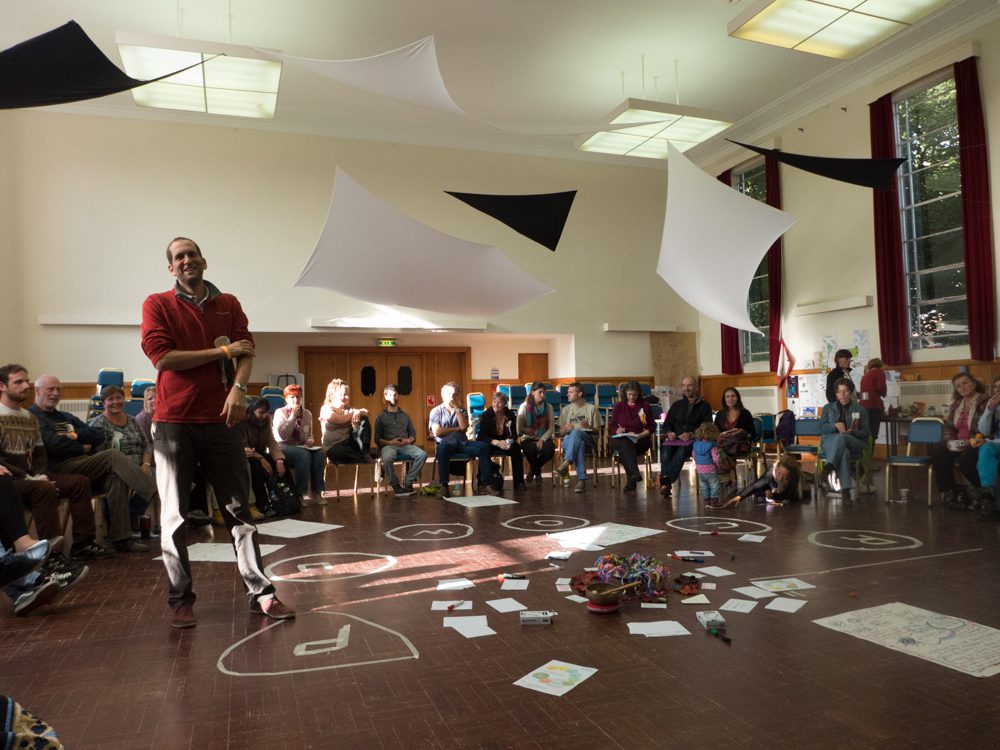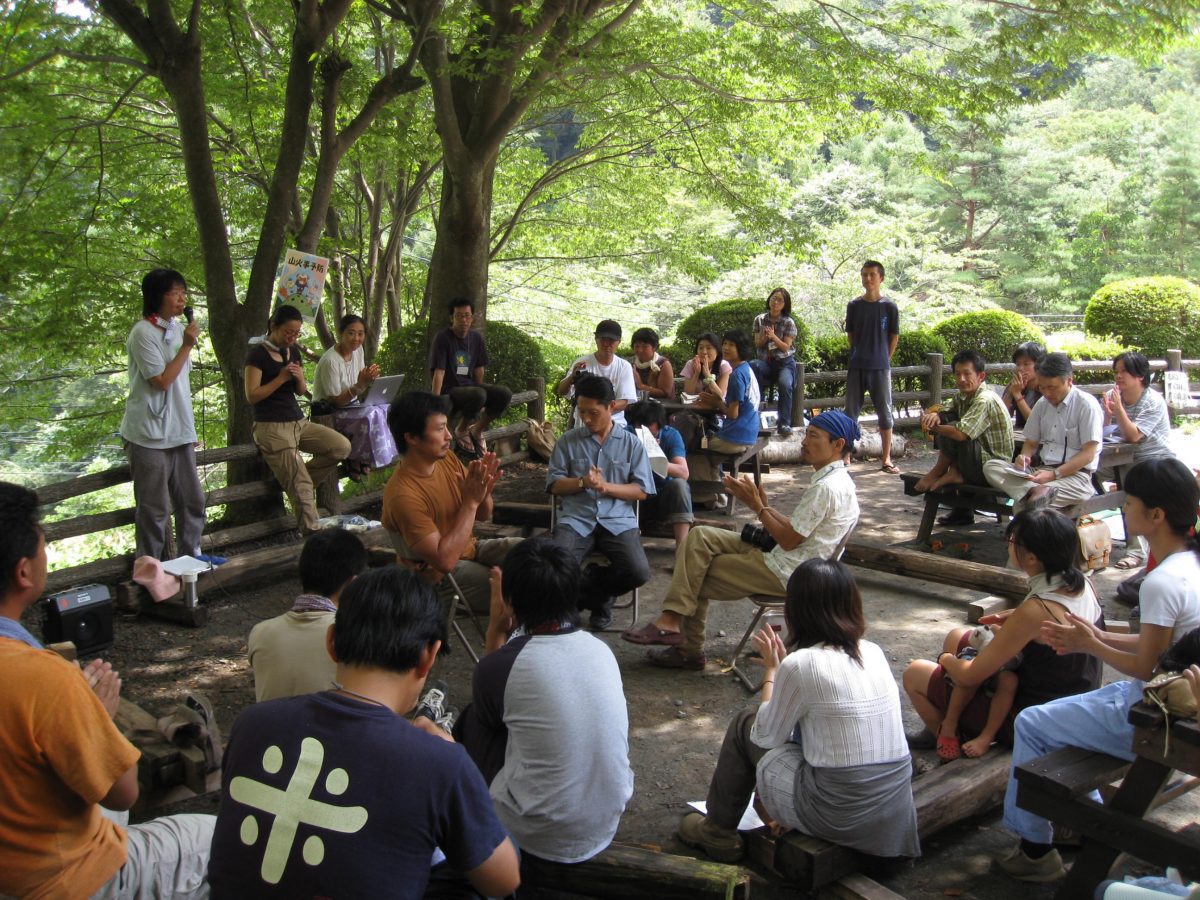Context
Transition Network is helping to bring about positive change in the world. We know that this work doesn’t just happen “out there”, but is rooted in and supported by everything we do to care for ourselves, for each other and for our organisation. We believe that how we go about things is just as important as what we do, so we pay attention to our internal structures, processes and relationships.
Making the shift towards a more healthy, creative, collaborative culture is challenging. Many of us find it difficult to fully open our hearts and minds to change and we often bring with us assumptions, behaviours and practices from our previous working lives. When we experiment with new processes and seek to create levels of openness and trust rarely experienced in mainstream organisations, we’re often working at the edges of our personal comfort zones. We try to take this gently!
One question that we live and work with constantly is how to respond in a healthy way to the tension between, on one side, the huge urgency of our work and the scale of the change so desperately required and, on the other side, the need for times in which to build relationships and have periods of reflection and renewal. Finding this balance, rather than relentlessly driving ourselves and others to constantly do and act, can offer many rewards in terms of the wellbeing, resilience, creativity and effectiveness of our team and organisation. Inner Transition practices and thinking really support us with this.
Difficult as it can be, we find this stuff deeply rewarding. We’re discovering that we can bring more of our ‘whole selves’ to work and benefit from hugely nourishing connections within and beyond our immediate team. We achieve things through creative collaboration that we might never have imagined individually. We think we’re becoming more responsive as an organisation and we’re increasingly linked to other groups, organisations and movements who are experimenting along similar lines. We feel privileged and excited to be developing a collaborative culture, which feels part of the paradigm shift needed to enable our communities and organisations to better live and work together.

Where we’ve got to
Over the years, the Transition Network team has undergone considerable structural and cultural change, shifting from a committed, slightly chaotic group of pioneers to a more substantial and structured organisation. We have done lots to build levels of trust and emotional intelligence across the team, we’ve agreed an evolving organisational purpose for Transition Network, which is supported by annual strategic priorities, and we feel we’re collaborating well within and beyond the team to deliver key pieces of work.
In 2016 we embarked on an organisational process to move our governance arrangements, group behaviours, decision-making methods, organisational structures, and processes, from a slightly confused mixture of hierarchical/traditional, collective/consensual and entrepreneurial autonomy, to a shared governance and consent-based decision making basis. The new shared governance structure was adopted in April 2018.
We believe our new governance model supports an agile and responsive organisation which can evolve to meet the emerging challenges of our times, supporting healthy cycles of action and reflection while maintaining strategic focus.
This work was supported with funding from the Tudor Trust, and with excellent coaching and accompaniment from the team at Université-du-nous.
The experiment continues and is complemented by broader experiments in distributing power, responsibilities and resources across the international network of which Transition Network is part (see Transition Hubs Group). Within this wider ecosystem, we are exploring whether and how shared governance can operate across very different cultures and contexts and support us to better understand, challenge and shift colonialist assumptions and behaviours.

We know many other groups across and beyond the Transition movement are grappling with similar issues around governance, decision making and developing healthy and values led organisational cultures. We’re already sharing what we’ve learned in our journey so far and are looking for more ways to do this. You can find out more about how we are using shared governance here.
In addition to shared governance, we’ve also done considerable work examining and agreeing on how we want to relate with each other within the Transition Network team and organisational system. This has led to a set of Relational Agreements that we do our best to follow. We recognise that these are setting a high standard for ourselves, and that as flawed human beings we do not always manage them all the time! However, we find it helpful to have these reminders of our intentions and to work towards embodying them as much as we can.
Transition Network Relational Agreements
When working for TN we agree to do our best to align ourselves with the following ways of being and relating to help us create a healthy collaborative culture.
These Relational Agreements were agreed by the Primary Circle in April 2018
Transition Network’s Relational Agreements
Accountability: We do what we say we are going to do and communicate clearly when we are no longer able to.
Appreciation: We find ways to cultivate appreciation and gratitude and express this regularly.
Awareness: We find ways to increase our self-awareness in relationship to our: needs; impact on others; relationships with power; and, our conditioned ways of being and relating.
Sovereignty: We act on our increasing self awareness and compassion around power, privilege, rank and the Drama Triangle to more and more:
- Exercise agency alongside empathy and compassion;
- Say ‘no’ when we need to;
- Voice ‘reasonable’ objections as and when they arise;
- Offer and receive feedback even when it feels uncomfortable and as early as we’re able to;
- Name conflict when we feel/see it, whether directly involved or not;
- Honour the diversity of our experience by expressing our appreciation, gratitude, joy, celebrations, achievements, hopes, longings and positivity as well as our fears, frustrations, anger, sadness, vulnerability, despair and grief.
Communication: We find ways to communicate with respect, care and compassion for ourselves and each other, including: listening at least as much as we speak; speaking one at a time without interrupting; supporting all voices to be heard; owning our judgements; seeking agreement around and holding confidentiality as appropriate; and, speaking from our needs and hearts.
Feedback: We take action to learn how to offer and receive feedback in healthy ways, even and especially when it feels uncomfortable, and to respect any agreed processes around this.
Conflict Resilience: We make the effort to find ways of becoming more conflict resilient, and to respect any agreed processes around this.
Resourced and Available: We do what we can to become adequately resourced and available within our collaborations – both physically and emotionally, by: cultivating balance in our lives and learning how to avoid burnout; finding ways of balancing our own needs with that of the group; and saying ‘no’ when we need to.
Where next?
Having made good progress with shared governance, and in developing the relational agreements, we chose to dive more deeply into two areas mentioned in the relational agreements that were not yet so well developed in terms of processes or practice. These are Feedback and Conflict Resilience. Our conversations with groups both within and beyond the Transition movement inform us that big needs and challenges remain in developing skills and confidence around these topics.
Many groups seem to struggle, lose key people or valuable time and energy, or even eventually dissolve, due to interpersonal tensions, unresolved conflict, mis-communications, differences in style, power struggles and the associated hurt feelings or disillusionment that can result. Transition Network have had our fair share of this as well, so we decided it was time to develop a more active and constructive approach to these issues.
Since then we’ve had a series of monthly whole team sessions where we explore these topics. We’ve looked at our own styles and preferences in regard to offering and receiving feedback, and in how we approach or handle conflict (or don’t!). We’ve discussed the attitudes and soft skills that support a conflict resilient group culture, explored some specific conflict resolution processes, and started to develop a ‘toolbox’ of useful guidelines and practices which we can turn to. It’s still early days and we recognise it’s a big juicy topic.
Over the longer term our intention is to collaborate with the Transformative Conflict Programme that’s started within the Transition Hubs domain; to both share what we’ve learned, and further co-create, with the wider Transition movement.
